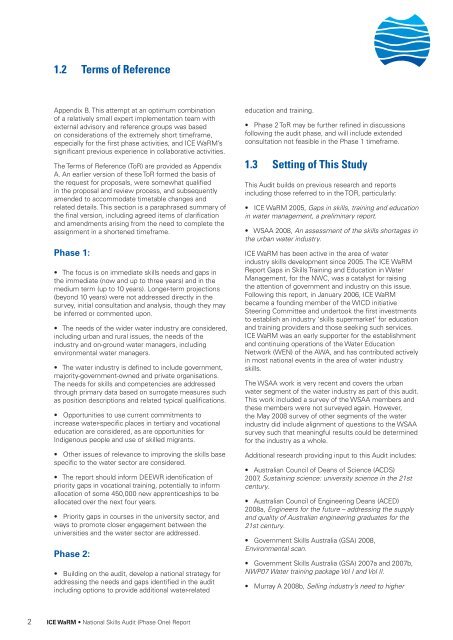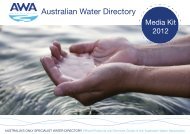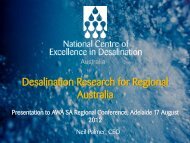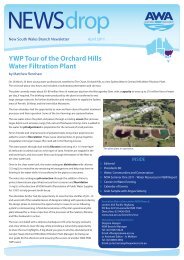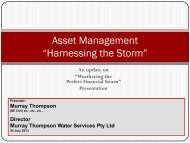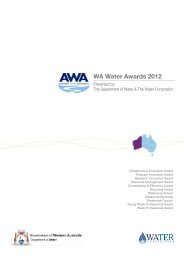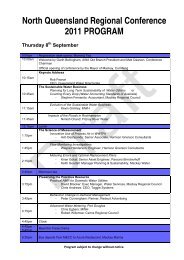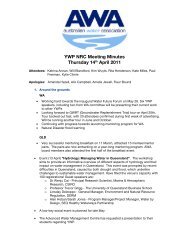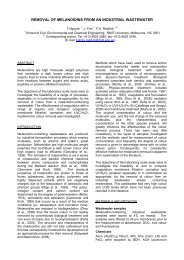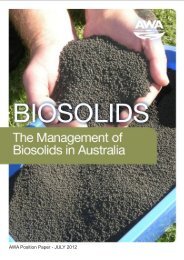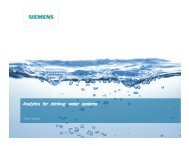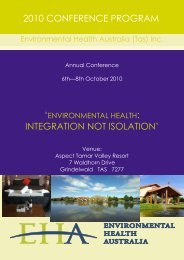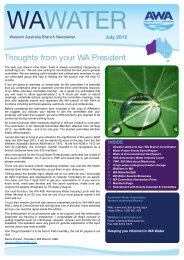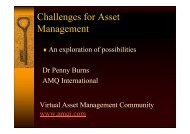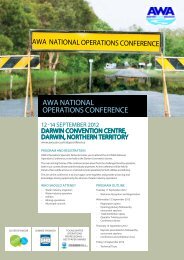1. Introduction1.1 BackgroundAt its 21st meeting on 26 March 2008, the Council of<strong>Australian</strong> Governments (COAG) made a number ofimportant decisions regarding the management of waterresources in Australia. Amongst those was recognitionof the current and likely future constraints imposed byskills shortages and gaps in the <strong>Australian</strong> water sector.Accordingly, it was agreed to commission an audit ofexisting and projected national water sector skills, to bereported to the 22nd COAG meeting on 3 July 2008, anddevelop a strategy to address identified skills shortagesand gaps, to be reported to the 23rd COAG meeting on3 October 2008. This work is to be commissioned andreported through the COAG <strong>Water</strong> Sub Group (WSG)and subsidiary governance structures, in this casemanaged by the Department of the Environment, <strong>Water</strong>,Heritage and the Arts (DEWHA).Following an accelerated procurement process,including assessment of invited proposals by arepresentative steering committee, on 29 April DEWHAverbally advised <strong>Water</strong>Ed Australia Pty Ltd, tradingas the International Centre of Excellence in <strong>Water</strong>Resources Management (ICE WaRM) that they wouldbe commissioned to undertake the <strong>National</strong> <strong>Water</strong><strong>Skills</strong> <strong>Audit</strong> and Strategy. The Terms of Reference (ToR)in Appendix A formed the basis of the procurementprocess, and were subsequently amended by mutualagreement to reflect changes arising in this fast-trackedprocess. Notably, the time available for submission ofthe <strong>Audit</strong> Report was further shortened to allow broaderconsultation and review prior to its presentation to the22nd COAG meeting.The <strong>National</strong> <strong>Water</strong> <strong>Skills</strong> <strong>Audit</strong> and Strategy assignmentis being undertaken in two phases:• Phase 1 – An audit of skills needs and gaps focusingon both current needs and projected future needs. Theeffective time available to conduct the audit and compilea draft final report was approximately five weeks.• Phase 2 – Building on the audit, the development of anational strategy for addressing the skills shortages andgaps identified in the audit, including options to provideadditional water-related education and training. Thedraft final report for Phase 2 is scheduled for completionthree months later, by the end of August 2008.This <strong>Audit</strong> Report is the outcome of Phase 1.This initiative under the COAG agenda follows a numberof relevant activities highlighting the issue of skillsshortages in the <strong>Australian</strong> water sector, some of whichhave been underway for several years. Peak waterindustry organisations and others grouped under the<strong>Water</strong> Industry Capacity Development (WICD) initiativedetermined several priority activities, and commencedimplementation of them under self-funding andsubscription arrangements. One of these was a studyof skills shortages and gaps, which was subsequentlyundertaken by WSAA, covering the major urban waterutility segment only.The results of the WSAA study were presented to a<strong>National</strong> <strong>Water</strong> Industry <strong>Skills</strong> Forum convened jointlyby the <strong>National</strong> <strong>Water</strong> Commission (NWC), WSAAand the <strong>Australian</strong> <strong>Water</strong> <strong>Association</strong> (AWA), held inCanberra on 17 March 2008 and attended by ChiefExecutive Officers (CEOs) and senior representativesof the industry. Agreements reached at this forumincluded the formation of a <strong>Water</strong> Industry <strong>Skills</strong> TaskForce, and action on a number of priority matters whichwere considered essential ingredients of any strategy.The activities of the Task Force are consistent with thisCOAG initiative, and while proceeding to some extentin parallel, are expected to provide valuable inputs intothe second phase of strategy development under thisassignment.ICE WaRM is an <strong>Australian</strong> Government initiative by thethen Department of Education, Science and Training(DEST, now the Department of Education, Employmentand Workplace Relations, DEEWR) aimed to provide anational focus and international gateway to the best ofAustralia’s expertise in water resources managementeducation, training and research. ICE WaRM’smain founding shareholders are five universities,supplemented by a broad range of partners andsupporters across the education and training and watersectors. Since becoming fully operational in 2005, ICEWaRM has provided the focus for many collaborativeachievements in water management training, educationand research, and has been particularly active in nationalwater-related skills development.For this assignment ICE WaRM has assembled animplementation team of research and water industryspecialists to address the specific elements of theworks to be undertaken, including:• South <strong>Australian</strong> Centre of Economic Studies(SACES), a joint venture of the University of Adelaideand Flinders University, based at the University ofAdelaide.• Centre for the Economics of Education and Training(CEET), a joint venture of Monash University and the<strong>Australian</strong> Council for Educational Research (ACER),based at Monash University.In addition, two external groups were convened toprovide structured support to the implementation team:an Advisory Group, comprising senior representativesfrom interested parties across the sector and led by theAcademy of Technological Sciences and Engineering(ATSE), and a Reference Group of people directlyengaged in water sector skills issues and capacitydevelopment, led by the <strong>Australian</strong> <strong>Water</strong> <strong>Association</strong>(AWA). Composition of these groups is described inICE WaRM • <strong>National</strong> <strong>Skills</strong> <strong>Audit</strong> (Phase One) Report
1.2 Terms of ReferenceAppendix B. This attempt at an optimum combinationof a relatively small expert implementation team withexternal advisory and reference groups was basedon considerations of the extremely short timeframe,especially for the first phase activities, and ICE WaRM’ssignificant previous experience in collaborative activities.The Terms of Reference (ToR) are provided as AppendixA. An earlier version of these ToR formed the basis ofthe request for proposals, were somewhat qualifiedin the proposal and review process, and subsequentlyamended to accommodate timetable changes andrelated details. This section is a paraphrased summary ofthe final version, including agreed items of clarificationand amendments arising from the need to complete theassignment in a shortened timeframe.Phase 1:• The focus is on immediate skills needs and gaps inthe immediate (now and up to three years) and in themedium term (up to 10 years). Longer-term projections(beyond 10 years) were not addressed directly in thesurvey, initial consultation and analysis, though they maybe inferred or commented upon.• The needs of the wider water industry are considered,including urban and rural issues, the needs of theindustry and on-ground water managers, includingenvironmental water managers.• The water industry is defined to include government,majority-government-owned and private organisations.The needs for skills and competencies are addressedthrough primary data based on surrogate measures suchas position descriptions and related typical qualifications.• Opportunities to use current commitments toincrease water-specific places in tertiary and vocationaleducation are considered, as are opportunities forIndigenous people and use of skilled migrants.• Other issues of relevance to improving the skills basespecific to the water sector are considered.• The report should inform DEEWR identification ofpriority gaps in vocational training, potentially to informallocation of some 450,000 new apprenticeships to beallocated over the next four years.• Priority gaps in courses in the university sector, andways to promote closer engagement between theuniversities and the water sector are addressed.Phase 2:• Building on the audit, develop a national strategy foraddressing the needs and gaps identified in the auditincluding options to provide additional water-relatededucation and training.• Phase 2 ToR may be further refined in discussionsfollowing the audit phase, and will include extendedconsultation not feasible in the Phase 1 timeframe.1.3 Setting of This StudyThis <strong>Audit</strong> builds on previous research and reportsincluding those referred to in the TOR, particularly:• ICE WaRM 2005, Gaps in skills, training and educationin water management, a preliminary report.• WSAA 2008, An assessment of the skills shortages inthe urban water industry.ICE WaRM has been active in the area of waterindustry skills development since 2005. The ICE WaRMReport Gaps in <strong>Skills</strong> Training and Education in <strong>Water</strong>Management, for the NWC, was a catalyst for raisingthe attention of government and industry on this issue.Following this report, in January 2006, ICE WaRMbecame a founding member of the WICD initiativeSteering Committee and undertook the first investmentsto establish an industry ‘skills supermarket’ for educationand training providers and those seeking such services.ICE WaRM was an early supporter for the establishmentand continuing operations of the <strong>Water</strong> EducationNetwork (WEN) of the AWA, and has contributed activelyin most national events in the area of water industryskills.The WSAA work is very recent and covers the urbanwater segment of the water industry as part of this audit.This work included a survey of the WSAA members andthese members were not surveyed again. However,the May 2008 survey of other segments of the waterindustry did include alignment of questions to the WSAAsurvey such that meaningful results could be determinedfor the industry as a whole.Additional research providing input to this <strong>Audit</strong> includes:• <strong>Australian</strong> Council of Deans of Science (ACDS)2007, Sustaining science: university science in the 21stcentury.• <strong>Australian</strong> Council of Engineering Deans (ACED)2008a, Engineers for the future – addressing the supplyand quality of <strong>Australian</strong> engineering graduates for the21st century.• Government <strong>Skills</strong> Australia (GSA) 2008,Environmental scan.• Government <strong>Skills</strong> Australia (GSA) 2007a and 2007b,NWP07 <strong>Water</strong> training package Vol I and Vol II.• Murray A 2008b, Selling industry’s need to higherICE WaRM • <strong>National</strong> <strong>Skills</strong> <strong>Audit</strong> (Phase One) Report


